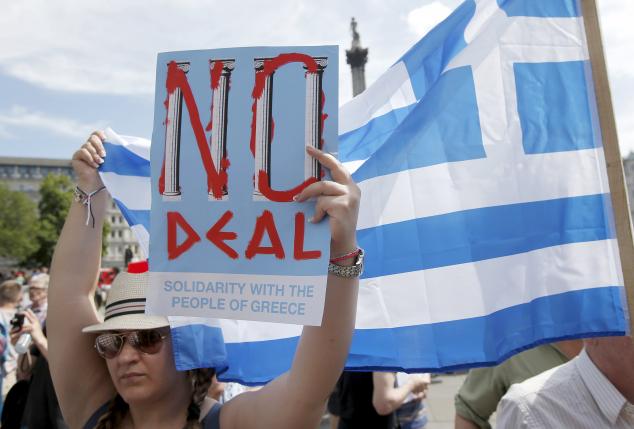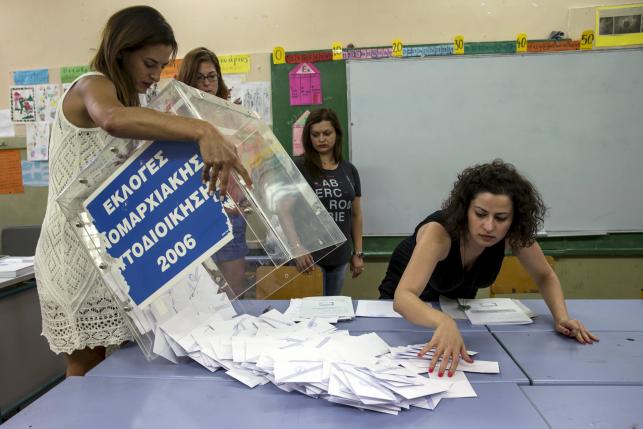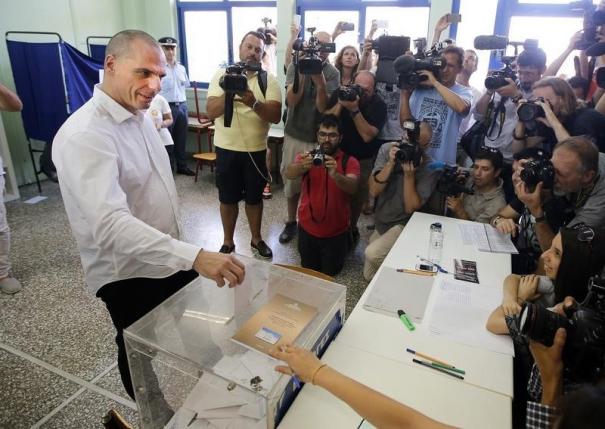www.aljazeerah.info
News, July 2015
Archives
Mission & Name
Conflict Terminology
Editorials
Gaza Holocaust
Gulf War
Isdood
Islam
News
News Photos
Opinion Editorials
US Foreign Policy (Dr. El-Najjar's Articles)
www.aljazeerah.info
Greeks Defy Europe with Overwhelming Referendum 'No', Rejecting the Creditors' Bailout Deal
Al-Jazeerah, CCUN, July 5, 2015
 |
 |
 |
 |
Greeks defy Europe with overwhelming referendum 'No'
Sun Jul 5, 2015 6:09pm EDT
By Karolina Tagaris and Lefteris Papadimas
Greeks voted overwhelmingly on Sunday to reject terms of a bailout, risking financial ruin in a show of defiance that could splinter Europe.
With nearly half of the votes counted, official figures showed 61 percent of Greeks rejecting the bailout offer. An official interior ministry projection confirmed the figure as close to the expected final tally.
The astonishingly strong victory by the 'No' camp overturned opinion polls that had predicted an outcome too close to call. It leaves Greece in uncharted waters: risking financial and political isolation within the euro zone and a banking collapse if creditors refuse further aid.
But for millions of Greeks the outcome was an angry message to creditors that Greece can longer accept repeated rounds of austerity that, in five years, had left one in four without a job. Prime Minister Alexis Tsipras has denounced the price paid for aid as "blackmail" and a national "humiliation".
Hundreds of Greeks began pouring into the central Syntagma square in front of parliament to celebrate, after a week of building desperation as banks were shut and cash withdrawals rationed to prevent a collapse of the Greek financial system.
"This is an imprint of the will of the Greek people and now it's up to Europeans to show if they respect our opinion and want to help," said Nikos Tarasis, a 23-year-old student.
Officials from the Greek government, which had argued that a 'No' vote would strengthen its hand to secure a better deal from international creditors after months of wrangling, immediately said they would try to restart talks with European partners.
"I believe there is no Greek today who is not proud, because regardless of what he voted he showed that this country above all respects democracy," Labour Minister Panos Skourletis said.
"The government now has a strong mandate, a strong negotiating card, to bring a deal which will open new ways."
But euro zone officials shot down any prospect of a quick resumption of talks. One official said there were no plans for an emergency meeting of euro zone finance ministers on Monday, adding the vote outcome meant the ministers "would not know what to discuss".
Many of Athens' partners have warned over the past week that a 'No' vote would mean cutting bridges with Europe and driving Greece's crippled financial system into outright bankruptcy, dramatically worsening the country's economic depression.
The result also delivers a hammer blow to the European Union's grand single currency project. Intended to be permanent and unbreakable when it was created 15 years ago, the euro zone could now be on the point of losing its first member with the risk of further unraveling to come.
"I believe such a result can be used as a strong negotiating tool so that Europeans can understand that we are not a colony," said Nefeli Dimou, a 23-year-old student in Athens.
Greek banks, which have been closed all week and rationing withdrawals from cash machines, are expected to run out of money within days unless the European Central Bank provides an emergency lifeline. Finance Minister Yanis Varoufakis is due to meet top Greek bankers later on Sunday and State Minister Nikos Pappas, one of Prime Minister Alexis Tsipras's closest aides, said it was "absolutely necessary" to restore liquidity to the banking system now that the vote is over.
However the European Central Bank, which holds a conference call on Monday morning, may be reluctant to increase emergency lending to Greek banks after voters rejected the spending cuts and economic reforms which creditors consider essential to make Greek public finances viable, central bankers said.
First indications were that any joint European political response may take a couple of days. German Chancellor Angela Merkel and French President Francois Hollande will meet in Paris on Monday afternoon. The European Commission, the EU executive, meets in Strasbourg on Tuesday and will report to the European Parliament on the situation.
"EU leaders must get together immediately, even on Monday. The situation is too serious to leave to finance ministers," said Axel Schaefer, a deputy head of the Social Democrat (SPD) group in the German parliament.
"You have to have confidence in the ability of the ECB to act. We must use all the possibilities in the EU budget to help Greece, which is still a member of the euro and the EU."
UNCHARTED
A 'No' vote puts Greece and the euro zone in uncharted waters. Unable to borrow money on capital markets, Greece has one of the world's highest levels of public debt. The International Monetary Fund warned last week that it would need massive debt relief and 50 billion euros in fresh funds.
Greek officials see the IMF report as a vital support for their argument that the bailout terms as they stood would merely have driven Greece further into depression.
Tsipras called the referendum eight days ago after rejecting the tough terms offered by international creditors as the price for releasing billions of euros in bailout funds.
He denounced the bailout terms as an "ultimatum" and his argument that a 'No' vote would allow the government to get a better deal appears to have convinced many Greeks, particularly among younger voters who have been ravaged by unemployment levels of nearly 50 percent.
"I have been jobless for nearly four years and was telling myself to be patient," said 43-year-old Eleni Deligainni, who said she voted 'No'. "But we've had enough deprivation and unemployment."
Opinion polls over the months have shown a large majority of Greeks want to remain in the euro.
But, exhausted and angry after five years of cuts, falling living standards and rising taxes imposed under successive bailout programs, many appear to have shrugged off the warnings of disaster, trusting that a deal can still be reached.
(Additional reporting by Noah Barkin and Madeline Chambers in Berlin, Isla Binnie in Rome, Paul Taylor in Brussels, Renee Maltezou, Lefteris Papadimas, Karolina Tagaris; Writing by James Mackenzie, Editing by Alessandra Galloni; Editing by Peter Graff)
***
First results show 'No' ahead in Greek referendum
France 24, 2015-07-05
Greek voters wearied by five years of crisis and belt-tightening head to the polls Sunday, with early results showing the 'No' camp backed by Prime Minister Alexis Tsipras in the lead.
After a dramatic week that saw Greece default on its debts, close its banks and start rationing cash, Greeks voted on Sunday on whether to accept or reject tough conditions sought by international creditors to extend a lending lifeline that has kept the debt-stricken country afloat.
Prime Minister Alexis Tsipras urged fellow Greeks to vote “No” to the new austerity measures proposed by the country’s creditors, saying this would strengthen his hand at the negotiating table. But EU leaders warned Greek voters that a negative outcome could jeopardize the country’s place in the euro zone.
Opinion polls show 'No' ahead in Greek bailout referendum
By George Georgiopoulos and Michele Kambas
Sun Jul 5, 2015 1:14pm EDTReuters --
Opinion polls released after Greece's bailout referendum on Sunday showed the 'No' vote ahead, suggesting voters had defied warnings from across Europe that rejection of the creditors' terms would set their country on a path out of the euro.
No exit polls were conducted, but three opinion polls by GPO, Metron Analysis and MRB all showed the 'No' camp' ahead by three points. A poll by Marc estimated 49.5 to 54.5 percent of Greeks voted 'No' compared to 45.5 to 50.5 percent voting 'Yes', based on surveys conducted through the week.
The polls were released after voting ended on Sunday because of a ban on the publication of polls on the day before a vote is held.
Nikos Filis, parliamentary spokesman for the ruling Syriza party said the result of the opinion polls would allow the government to move ahead quickly to reach a deal with creditors.
"I think this is guidance for the government," he said after the polls came out.
Athens' partners have warned over the past week that a 'No' vote would mean cutting bridges with Europe and driving Greece's crippled financial system into outright bankruptcy, dramatically worsening the country's 5-year-long depression.
If confirmed, the result will also deliver a hammer blow to the European Union's grand single currency project. Intended to be permanent and unbreakable when it was created 15 years ago, the euro zone could now be on the point of losing its first member with the risk of further unraveling to come.
Greek banks, which have been closed all week and rationing withdrawals from cash machines, are expected to run out of money within days unless the European Central Bank provides an emergency lifeline.
Opinion polls show 'No' ahead in Greek bailout referendum | Reuters. .
However central bankers warned before the vote that a 'No' would make it almost impossible for the ECB to turn on the taps, leaving the Greek financial system without funds and facing imminent collapse.
A 'No' vote would leave Greece and the euro zone in uncharted waters. Unable to borrow money on capital markets, Greece has one of the world's highest levels of public debt. The International Monetary Fund warned last week that it would need massive debt relief and 50 billion euros in fresh funds.
Greece's leftwing government called the referendum only a week ago after it rejected the tough terms offered by international creditors as the price for releasing billions of euros in bailout funds.
Opinion polls show 'No' ahead in Greek bailout referendum | Reuters. .
Prime Minister Alexis Tsipras denounced the bailout terms as "blackmail" and declared that a 'No' vote would strengthen the government's hand to get a better deal that would allow the banks to re-open this week.
A succession of European leaders and policy makers warned, however, that the bailout terms were no longer on the table. They said the vote was now effectively about whether Greeks wanted to remain in the euro or return to the drachma.
Opinion polls show a large majority of Greeks want to remain in the euro. But, exhausted and resentful after years of austerity cuts imposed under successive bailout programs, many appear to have shrugged off the warnings of disaster, trusting that a deal can still be reached.
(Additional reporting by Noah Barkin and Madeline Chambers in Berlin, Isla Binnie in Rome, Lefteris Karagiannopoulos and Michele Kambas in Athens; Writing by Deepa Babington and Matt Robinson; Editing by Peter Graff)
***
For a background about the Greek financial tragedy, read:
Greek Debt Crisis Caused by Military Spending, Deficits, and Goldman Sachs Corruption By Erik Fair and Beat Balzli.htm
***
Share this article with your facebook friends
|
|
|
|
||
|
||||||


